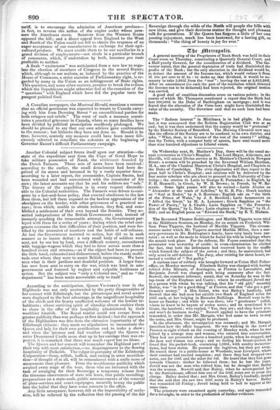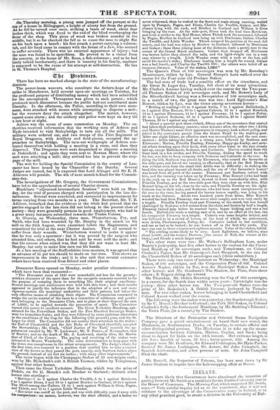Zbe _Metropolis.
A general meeting of the Proprietors of Bank Stock was held in their Court-room on Thursday, constituting a Quarterly General Court, and a Half-yearly General, for the consideration of a dividend. The Go- vernor stated, that the general depression of trade had diminished the profits of the Bank ; but the only alteration in the dividend would be, to deduct the amount of the Income-tax' which would reduce it from 3/. 10s. per cent to 3/. 88.: to make up that dividend, it would be ne- cessary to take 5,9951. from the rest "; leaving the rest at 2,863,2881. After an amendment (to omit the part of the resolution which directed the Income-tax to be deducted) had been rejected, the original motion was carried.
A good deal of resnitless discussion arose on various points; in the course of which Mr. Thompson mentioned a report that the Bank had lent 300,0001. to the Duke of Buckingham on mortgage; and it was feared that the alteration of the Corn-laws might have diminished the value of the security. The Governor said that no such loan had been made.
The " Reform interest" in Middlesex is in bad plight. In June last, it was announced that the Reform Registration Club was at an end ; but it was then understood that the county would be "protected" by the District Society of Brentford. The Morning Chronicle now says that the efforts of the Society are to be confined to its own district, and asks, "What, then, is to become of the rest of the county ?" adding, that the Tories, with a compact body of agents, have sent round more than nine hundred objections to Liberal voters.
On Wednesday next, St. Matthew's Day, there will be the usual-an- nual ceremonies at Christ's Hospital. The Lord Mayor, Aldermen, and Sheriffs, will attend Divine service at St. Matthew's Church in Newgate Street ; a sermon will be preached by the Reverend William Harrison, M.A., one of the Classical Masters at Christ's Hospital, and Chaplain to the Duke of Cambridge. The civic dignitaries will then repair to the great hall iu• Christ's Hospital ; and orations will be delivered by the four senior scholars who are about to proceed to the University of Cam- bridge ; the oration in Latin by George E. Pattenden ; in English, by P. H. Hammill ; in Greek, by W. H. Brown ; in French, by W. Ro- manis. Some light poems will also be recited—Latin A Icaics on " Alexander at the tomb of Achilles," by G. B. Pix ; Greek iambics on "Saul at Endor," by A. S. Harrison ; English ode on "the birth of the Prince of Wales," by J. S. Benifold ; Latin hexameters on " Alfred the Great," by M. A. Leicester; Greek Sapphics on "the Power of Poetry," by A. Chubb ; Latin Sapphics on "the Preserva- tion of the Queen," by L. Dale; Latin elegiacs on "Nelson," by G. J. Gill ; and an English poem on "Edward the Sixth," by E. T. Hudson.
The Reverend Thomas Boddington and Matilda Tippetts were tried at the Middlesex Sessions, on Monday, for an assault on Frederick Wil- liam Penn Tippetts' the husband of Matilda Tippetts. The circum- stances under which Mr. Tippetts married Matilda Millar, then a nur- sery-governess in Mr. Boddington's family, have very lately been nar- rated; as well as the mode in which he found his wife in lodgings where the assault took place. For the defence, Mr. Payne contended that the prosecutor was unworthy of credit : in cross-examination he elicited the fact, that both the defendants had received hurts in the scuffle which formed the subject of the action ; and they, he maintained, had only acted in self-defence. The Jury, after retiring for three hours, re- turned a verdict of "Not guilty."
A curious case of robbery was brought forward at Union Hall Police- office, on Monday morning. Elizabeth Bailey was charged with having robbed John Marquis, of Accrington, at Preston in Lancashire, and Benjamin Jovell was charged with being accessory after the fact. Stowell, the common informer, stated, that on Saturday he was in the tap-room of the Elephant and Castle ; where he overheard Jovell say to a person with whom he was talking, that his "old girl," meaning Bailey, was "in for a good thing" at Preston, and that "she got a gen- tleman's money." A Mrs. Grant, who was Bailey's landlady, told Stowell that she had seen her exhibit two Bank of England notes for 500/. each, at her lodging in Hercules Buildings. Stowell went to the house on Sunday ; and while he was there, two " gentlemen " called, whom he knew to be buyers of stolen notes ; and he mentioned it to Grant, the landlord ; who replied, " Yes, they are; and they know you, and won't do business to-day." Stowell applied to have the prisoners remanded, in order that Mr. Marquis, who had come to town to stop the notes, and Mrs. Grant, might be produced.
In the afternoon, the investigation was resumed ; and Mr. Marquis described how the affair happened. He was walking in the town of Preston at eight o'clock on the evening of Monday week, when he was joined by a strange man and woman, who entered into conversation. They had not proceeded above a hundred yards, when he stopped, and the man and woman ran away ; and on feeling his breast-pocket, he found that his pocket-book, containing 1,9901., with sundry memoran- dums, had been stolen. He pursued the fugitives, but they got away. He traced them to a public-house at Woodside, near Liverpool, where their conduct had excited suspicion ; and there they had dropped two notes, one for 1001. and the other for 101. He heard that they had gone towards Chester: thither he followed them ; but he lost the trace. Jovell was not the man who robbed him, but he thought that Bailey was the woman. Stowell said that Bailey, when he accompanied her to the Stationhouse, offered him one of the 5001. notes not to press the charge. Bailey denied that ; and Mrs. Grant, Bailey's landlady, denied that she said that she saw two 5001. notes in Bailey's hands. Bailey was remanded till Friday ; Jovell being held to bail to appear at the same time.
The prisoners were examined again yesterday, and again remanded for a fortnight, in order to the production of further evidence.
On Thursday morning, a young man jumped off the parapet at the sop of a house in Billingsgate, a height of ninety feet from the ground. As he fell he turned over once, striking a beam of wood, about four inches thick, which was fixed to the end of the blind overhanging the front of the shop. This piece of wood was broken asunder in the middle, but it so far checked the fall as to cause the man to alight flat on his back upon a bench : his feet struck a porter carrying a salmon- tub, and his head came in contact with the breast of a Jew, who seemed to suffer severely. There was 'no external appearance of injury ; but the man was found to be speechless. He proved to be a visiter from the country, at the house of Mr. Rous, a fish-salesman ; and as he had lately talked incoherently, and there is insanity in his family, madness is supposed to be the cause of his attempt at self-destruction. He lies In St. Thomas's Hospital.



























 Previous page
Previous page